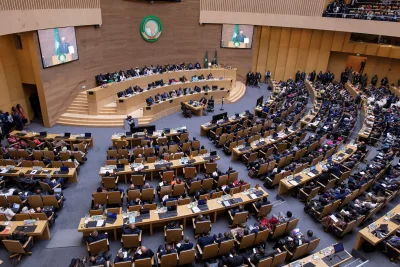The Nigerian Stock Exchange has launched a growth board to help SMEs raise long-term risk capital. Tom Minney reports
Dynamic Nigerian entrepreneurs are in focus after the Nigerian Stock Exchange launched a growth board on 29 January for fast-growing small and medium enterprises (SMEs), to help them raise long-term risk capital and grow.
Oscar Onyema, OON, CEO of the exchange, said: “We have partnered with relevant stakeholders to design a suite of cost-effective services to give listed companies a competitive edge within their respective industries while stimulating investors’ interest through enhanced information delivery.”
Services offered include: pre-listing diagnostics, institutional services such as audit, financial advisory, legal advisory and corporate strategic advisory, investor relations, analyst coverage, corporate access and corporate governance.
The Entry Segment is for companies with a total market value of shares (market capitalisation) starting from N50m ($136,000), compared to the Standard Market for companies with a market capitalisation from N500m. Investors choose segments according to their investment preferences.
The NSE’s other boards include the Main Board for well-established companies with a track record of commitment to high standards of disclosure and corporate governance, the Alternative Securities Market (ASeM) focusing on small to mid-sized companies, and Premium Board added in August 2015 for companies that meet the most stringent listing criteria of capitalisation, corporate governance and liquidity and which want more visibility to attract global capital flows and reduce the cost of funding.
According to Onyema: “SMEs have contributed about 48% of the national GDP in the last 5 years, according to the Nigeria Bureau of Statistics. This segment of the economy also accounts for 96% of operational businesses and 84% of employment.”
Interswitch bond
Interswitch, a top African tech firm focusing on digital payments in Nigeria and other African countries, has raised N23bn ($63.3m) by issuing a bond, which it listed for trading on the Nigerian Stock Exchange on 31 January.
Interswitch is expected to list on the London Stock Exchange this year after Visa invested a reported $200m last November, valuing it at $1bn and making it Africa’s first fintech ‘unicorn’ or billion-dollar company. Reports of an international listing have been circulating since 2016.
The bond is a callable senior unsecured bond, with a tenor (duration) of seven years, at a fixed coupon rate of 15% a year. It is part of a N30bn debt programme issued through a special company, Interswitch Africa One Plc, set up for the purpose.
Mitchell Elegbe, Group Managing Director and Founder of Interswitch Limited, said: “We are delighted with the outcome of our capital-raising efforts. We have evolved over the past 17 years into a technology unicorn focused on providing digital solutions to customers in Nigeria and across Africa. We therefore see this listing as a first step in a new phase of our journey and we are determined to keep going.”
FBNQuest Merchant Bank and Stanbic IBTC Capital were the Lead Financial Advisors and Issuing Houses with ABSA Capital Markets Nigeria, FCMB Capital Markets, Quantum Zenith Capital & Investments and Rand Merchant Bank Nigeria.
Demutualisation
The Nigerian Stock Exchange stepped onto its long road to demutualisation in March 2017, when Members of the exchange agreed the necessary resolutions to start the conversion from a not-for-profit entity limited by guarantee into a profit-making, public limited liability company owned by shareholders.
President Muhammadu Buhari signed the Demutualisation of the Nigerian Stock Exchange Bill into law in August 2018.
In January 2020 the bourse received a letter from the Securities and Exchange Commission Nigeria with “no objection” to its planned conversion.
Oscar Onyema, CEO said: “With this consent, the exchange will proceed quickly to the next phase of holding a Court Ordered Meeting and an Extraordinary General Meeting to pass requisite resolutions including the approval of the draft Constitution; [the] basis of allotment and split of shares between members; approval of a new Board of Directors; and approval of new corporate governance and regulatory structures.”
Want to continue reading? Subscribe today.
You've read all your free articles for this month! Subscribe now to enjoy full access to our content.
Digital Monthly
£8.00 / month
Receive full unlimited access to our articles, opinions, podcasts and more.
Digital Yearly
£70.00 / year
Our best value offer - save £26 and gain access to all of our digital content for an entire year!
 Sign in with Google
Sign in with Google 



